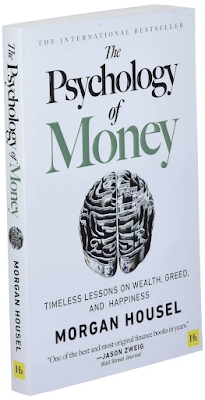Morgan Housel is a Collaborative Fund partner and a former Motley Fool and Wall Street Journal, the columnist. He is a two-time winner of the Society of American Business Editors and Writers' Best in Business Award. He is also a two-time finalist for the Gerald Loeb Award for Distinguished Business and Financial Journalism and a winner of the New York Times Sidney Award. Morgan has spoken at over 100 conferences in a dozen different countries.
 |
| THE PSYCHOLOGY AND MONEY |
The Psychology of Money delves into the psychology of our financial shortcomings. Housel considers how previous experiences, shifting the goalposts, and being coldly rational can all harm long-term financial gains. The alternative is to set clear, reasonable financial goals that do not rely too heavily on past financial performance. If you can put these strategies into action, you will be financially successful in the long run. As a result, you will benefit from the wonders of compound interest.
The Main Content:
- No one's crazy.
- Luck & Risk.
- Never Enough.
- Confounding Compounding.
- Getting Wealth vs Staying Wealthy.
- Tails, You Win.
- Freedom.
- Man in the car Paradox.
- Wealth is what you don't see.
- save money.
- Reasonable > Rational
- Surprise!
- Room For Error
- You will Change.
- Nothing's Free.
- You & Me.
- The Seduction of pessimism.
- When You Will Believe anything.
- All Together Now.
- Confessions.
Comments
Post a Comment